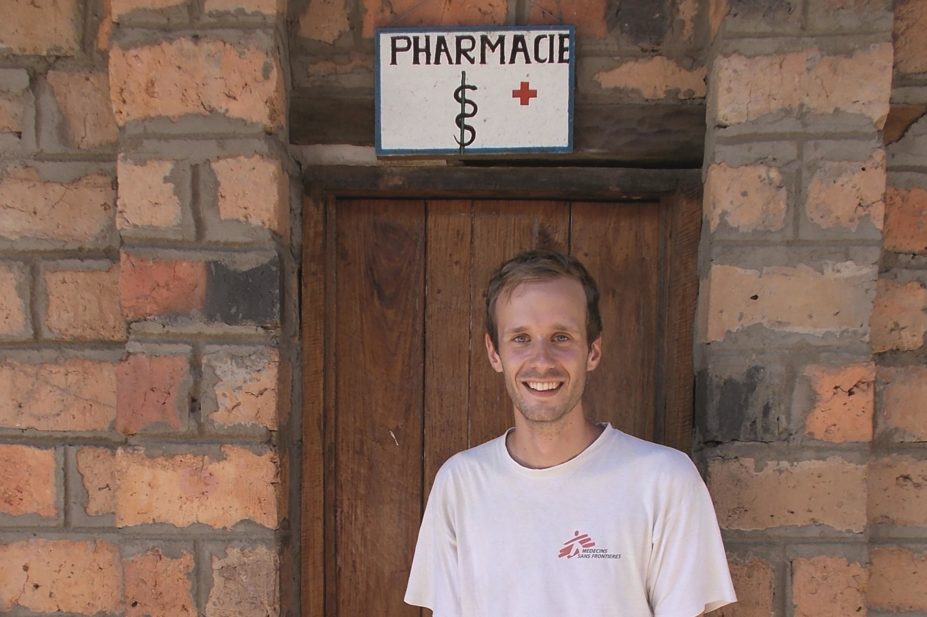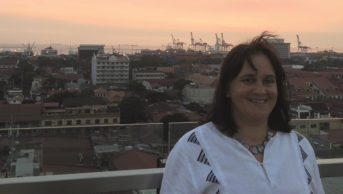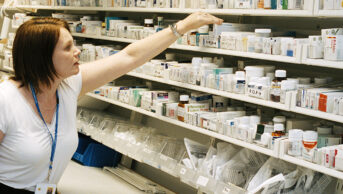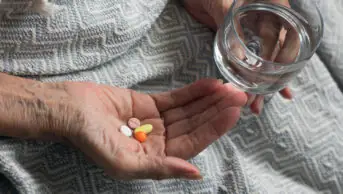
Courtesy of Owen Wood
Owen Wood works as a ‘flying’ pharmacist for Médicins San Frontières (MSF), a private international charity that sends healthcare workers to developing countries and areas in crisis.
Why did you decide to work for MSF?
I was manager of an independent multiple community pharmacy before applying for MSF. I volunteered for a short stint in a health centre in West Africa in early 2015 before joining MSF later that year. I wanted to apply my skills and experience as a pharmacist in a new environment away from my comfort zone and challenge myself. I joined the pharmacy profession to improve health and the scope for this in the humanitarian sector is huge — the smallest interventions can make big differences to people’s lives.
What does your role with MSF involve?
I am responsible for pharmacy operations of MSF’s Katanga Mission in the Democratic Republic of Congo (DRC). We support a 70-bed Ministry of Health (MOH) hospital and seven primary care health centres in a northern area of the province that is the site of two complex conflicts — known as the ‘triangle of death’ region.
My tasks include: the day-to-day management of the national pharmacy team in the hospital; working closely with logistics to maintain a functional supply chain; preparing our international medical orders; providing training and coaching to nursing and medical staff; establishing new systems of supply and distribution across our primary care services; and supporting the national tuberculosis programme. I work with the clinical team at ward level, advising on and supporting prescribing in line with available stock and the MSF guidelines.
Because my role is ‘flying’, I also support the team in the capital Lubumbashi and the Katanga Emergency Response Unit, for which I provide pharmaceutical support and advise on medicines quality issues in the field. I was also directly involved in emergency measles and malaria interventions.
What has been the highlight of your time with MSF?
I was involved in a mass vaccination campaign against measles as part of our response to the epidemic throughout 2015. I supervised a vaccination team of four nurses and community volunteers. This involved setting up the vaccination circuit at each site, keeping the vaccines at the correct temperature during transport and storage, overseeing the registration of patients, preparing the vaccines, administering the vaccination, and recording the final numbers. It was hard work but during the week I was involved our small team vaccinated 3,000 children.
What is the most challenging part of your work?
The logistical constraints of working in an unstable and inaccessible region with minimal infrastructure provides a lot of supply challenges. Because of the location we are limited to twice yearly international deliveries, which then take up to six months to arrive. This meant planning medical activities and predicting stock requirements for a six-month period, six months in advance. Any unplanned changes or events outside of our control could have a big impact on our stock. My role was to manage the consumption of stock and act as a link between the logistics and medical team to try to prevent any critical stock shortages.
What have you learnt working for MSF?
As well as learning about Congolese culture, I learnt a lot from my expat colleagues. MSF employ expat staff from all over the world — over the past nine months I have worked with people from six continents, including countries such as Canada, the United States, Germany, France, Italy, Tunisia, Kenya, Israel, Argentina, Ethiopia, Sweden, Holland and Russia. I learnt about the different cultures and customs, and the way the British are viewed by the rest of the world — apparently, we are polite with bad teeth. I also discovered a lot about the healthcare systems and drug use in these countries. For example, our Canadian doctor was not happy using tramadol because it is rarely used there, while the Congolese doctors were afraid of using morphine.
What is your professional plan for when you return to the UK?
I hope to continue working in the humanitarian sector and build on my experiences from the DRC. There are several different roles within MSF ranging from clinical trials pharmacists to supply-focused roles, as well as opportunities across the wide range of humanitarian and development organisations worldwide. It is an exciting time to be a pharmacist because the humanitarian sector is starting to realise the importance of pharmacists. I hope to become more involved in emergency preparedness and emergency interventions.
What should someone who wishes to work in the humanitarian sector consider before they do so?
Depending on the role, working in the humanitarian sector can be a lifestyle choice. There is obviously a lot of travel and substantial time commitment involved. Those working in emergency relief may be asked to go abroad at short notice. These factors are not compatible with some lifestyles but can be made to work and more feasible shorter term commitments are often possible.
Getting into humanitarian work would usually require some prior experience in a developing country. There are thousands of charities and opportunities to be involved in a range of volunteering activities based around healthcare provision. Having that experience and understanding healthcare delivery in stable developing countries makes the transition to working in humanitarian emergencies or unstable regions much easier.
You may also be interested in

Using medicines knowledge to provide humanitarian aid around the world

Medicines shortages and slow approvals put ‘significant burden’ on pharmacists, says report
